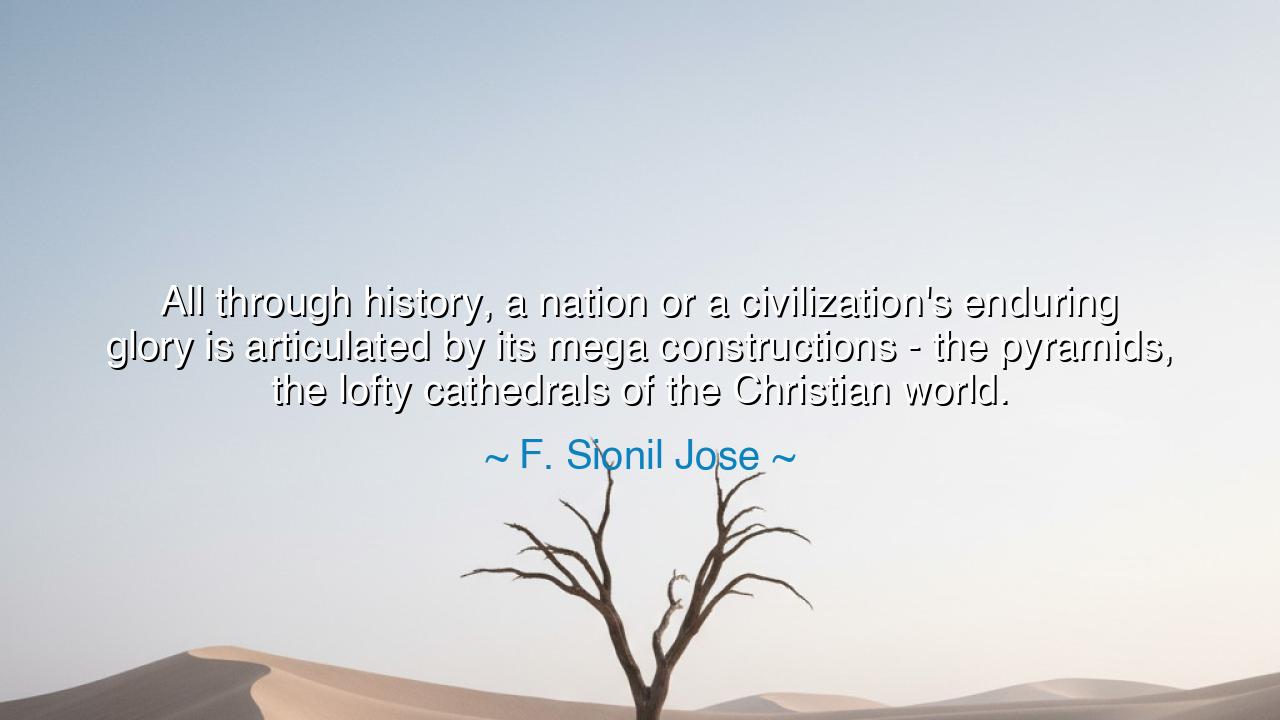
All through history, a nation or a civilization's enduring glory
All through history, a nation or a civilization's enduring glory is articulated by its mega constructions - the pyramids, the lofty cathedrals of the Christian world.






In the voice of one who pondered the soul of nations, the Filipino novelist and sage F. Sionil José once wrote: “All through history, a nation or a civilization’s enduring glory is articulated by its mega constructions — the pyramids, the lofty cathedrals of the Christian world.” These words, though spoken of stone and steel, reach far beyond architecture. They speak of the human spirit’s longing for permanence, of its desire to carve into the earth and sky the evidence of its dreams. Through these monumental works, the story of a people becomes visible — their power, their belief, their will to endure. For when the generations fade and voices fall silent, what remains are these vast creations that seem to whisper, “We were here. We believed. We built.”
In José’s wisdom, the mega constructions — the pyramids of Egypt, the cathedrals of Europe, the temples of Asia, and the monuments of the Americas — stand not only as feats of engineering, but as mirrors of civilization’s soul. They were born of faith, of ambition, of an unyielding desire to transcend mortality. The pyramids, rising from the desert sands, are not merely tombs but eternal prayers in stone, testimonies to the Egyptian belief that kings and gods walked together. The cathedrals, with their soaring spires and stained glass, were not mere shelters for worship, but embodiments of divine aspiration — attempts to reach heaven through human hands. These structures are not silent; they sing across centuries of humanity’s yearning for eternity.
The origin of José’s reflection lies in his deep understanding of history and culture. As a writer, he saw that nations do not endure through wealth or conquest alone, but through what they build — materially and morally. His homeland, the Philippines, bears traces of colonizers and kingdoms alike, yet its truest monuments are those that express the resilience of its people — its churches, its bridges, its cities rising from the ashes of war. In writing these words, José was not glorifying vanity or empire, but recognizing the timeless truth that creation is the soul’s answer to destruction. The monuments of civilization are its collective heartbeat, pulsing even after the body has turned to dust.
Look to history, and his words come alive. When Rome fell, its legions disappeared, but the Colosseum remained, echoing with the memory of glory and ruin. When Greece waned, its philosophy survived in marble and column. The Great Wall of China still snakes across mountains, whispering of the hands that built it, the empires that rose and fell beside it. And in every corner of the world, from the Machu Picchu of the Andes to the Angkor Wat of Cambodia, the stones themselves speak — they are the language of legacy. Even the ruins are holy, for they remind us that greatness is not measured by time’s mercy, but by humanity’s capacity to dream in stone.
But José’s wisdom, though grand in imagery, also carries humility. He reminds us that behind every cathedral stands not just a monarch or architect, but countless unnamed laborers — the craftsmen, masons, and dreamers whose sweat and suffering gave birth to beauty. The glory of civilization is not the monument alone, but the human will that built it. Every stone laid was an act of faith — faith that the structure would outlive its makers, that beauty could defy mortality. In that act lies the true essence of civilization: not wealth or conquest, but the courage to build for those who will come after us.
The lesson, then, is clear: we, too, must build our own monuments, though not all of stone. Some will build in architecture, others in art, education, or justice. Our modern world, obsessed with speed and impermanence, must remember that what gives life meaning is not what we consume, but what we create. A civilization that forgets to build — in form or in spirit — begins to crumble long before its walls do. The pyramids and cathedrals remind us that human greatness is not born of comfort, but of devotion — to an ideal, to a god, to a dream.
So, O children of time, hear the call of F. Sionil José: build something that endures. Whether it is a bridge between hearts, a monument of truth, or a sanctuary of compassion, let your life be part of the architecture of meaning. For civilizations are remembered not by the wars they fought, but by the wonders they left behind. Let your creation — humble or mighty — be your cathedral. In this way, you will join the eternal conversation of builders, whose works defy the silence of centuries and proclaim forever the divine truth that to build is to believe.






AAdministratorAdministrator
Welcome, honored guests. Please leave a comment, we will respond soon